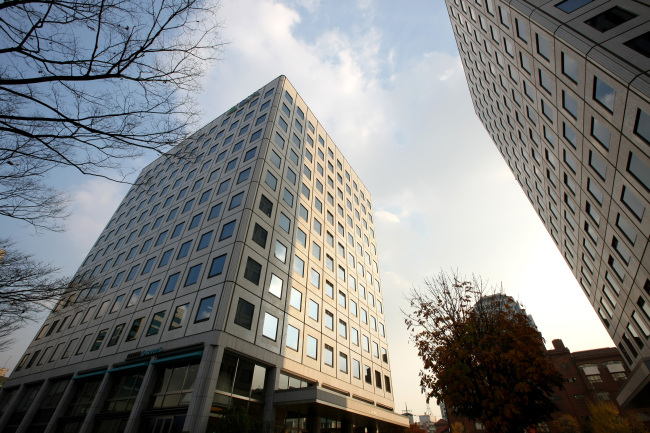 |
The Hyundai Group headquarters in Seoul. (Bloomberg) |
Some market insiders said Tuesday that Hyundai Group could undergo a liquidity crisis as its flagship unit, Hyundai Elevator, has faced a deadlock in its plan to raise equity capital by issuing additional stocks.
Their forecast came after financial authorities recently delayed approval of Hyundai Elevator’s application for a capital increase. Hyundai Elevator’s major shareholders include group chairwoman Hyun Jeong-eun and several group affiliates.
“While the company sought to issue 6 million fresh shares worth 217.5 billion won ($205 million), the Financial Supervisory Service has rejected the application,” an FSS official said.
Saying that the authorities demanded a revised proposal, he cited instability in the conglomerate’s shareholding structure and a recent drop in stock prices of major affiliates for the initial disapproval.
The company's second-largest shareholder -- Schindler Holding AG, which is headquartered in Switzerland as a European elevator manufacturer -- has argued that Hyundai Elevator and Hyundai Merchant Marine engaged in dubious intra-group funding or financial transactions.
Chairwoman Hyun and friendly powers including Hyundai Logistics hold a 45 percent stake in Hyundai Elevator and Schindler Holding’s stake comes to 30.9 percent.
Market insiders say the group’s new stock issuance plan is somewhat aimed at hampering hostile takeover bids from foreign investors. “But Schindler Holding is poised to make the best of the opportunity in terms of further increasing its stake,” said a research analyst.
Meanwhile, the FSS also tackled stock prices of Hyundai Merchant Marine on the main bourse. Its stocks, which were traded at around 19,000 won per share in the third quarter, have dropped to the 10,000 won level.
Regulatory inspectors called for the group to publicize details on the affiliates’ financial derivatives trading on the basis of Hyundai Merchant Marine’s stocks.
Some regulatory officials downplayed the possible liquidity crisis of Hyundai Group at the current stage, stressing that it had secured cash-equivalent resources worth about 600 billion won.
By Kim Yon-se (kys@heraldcorp.com)







